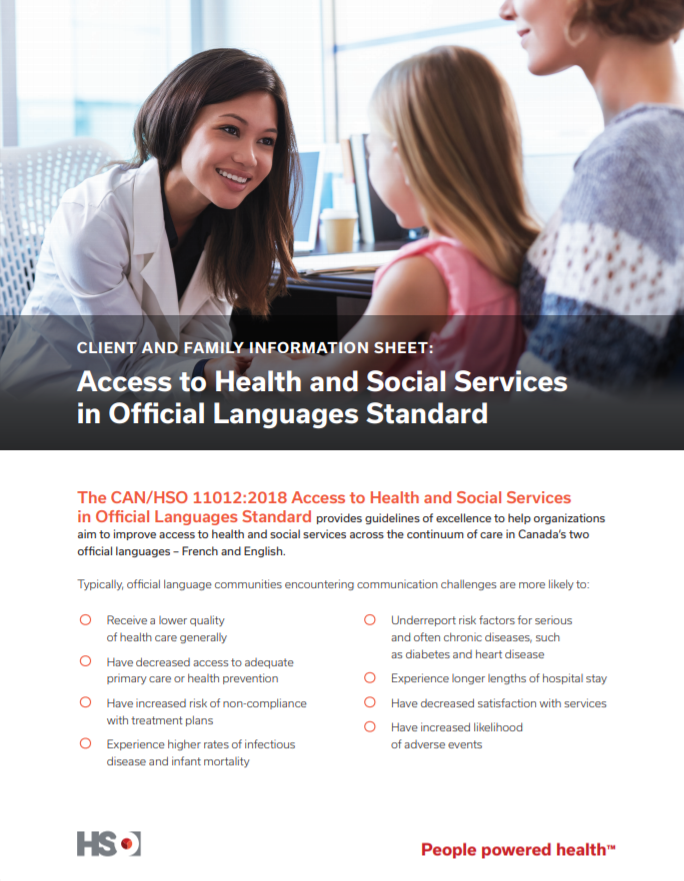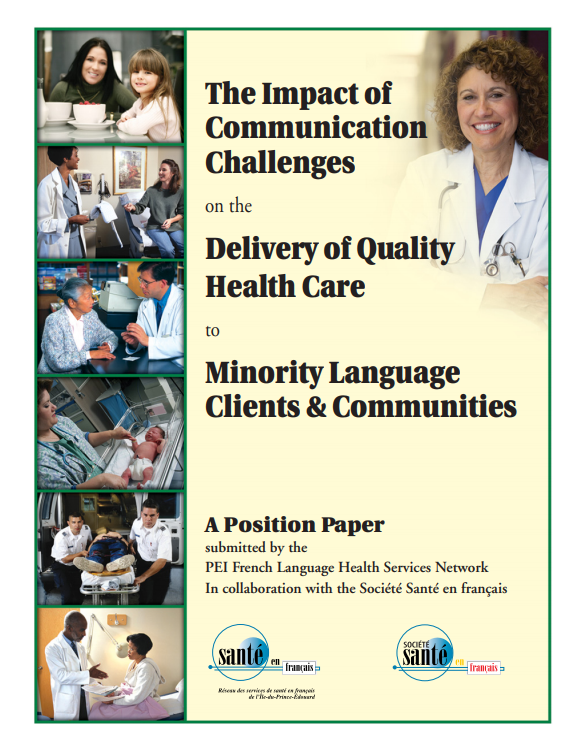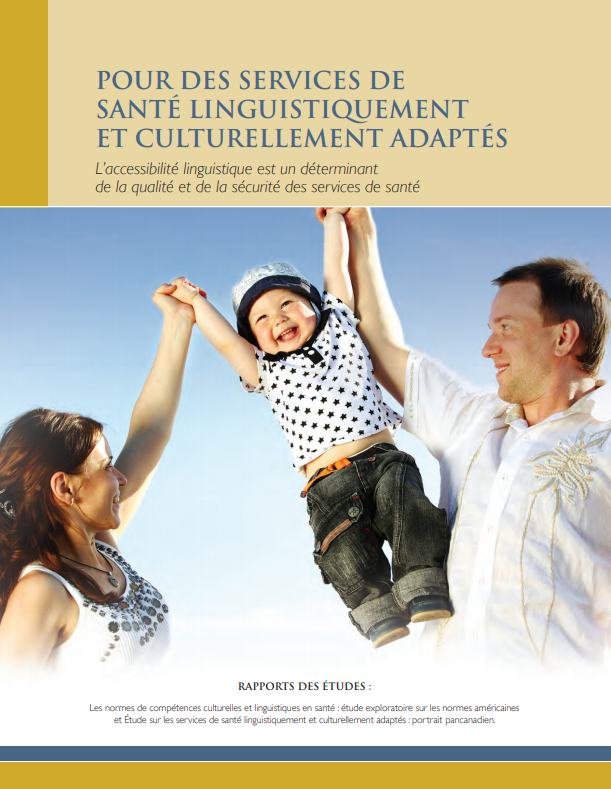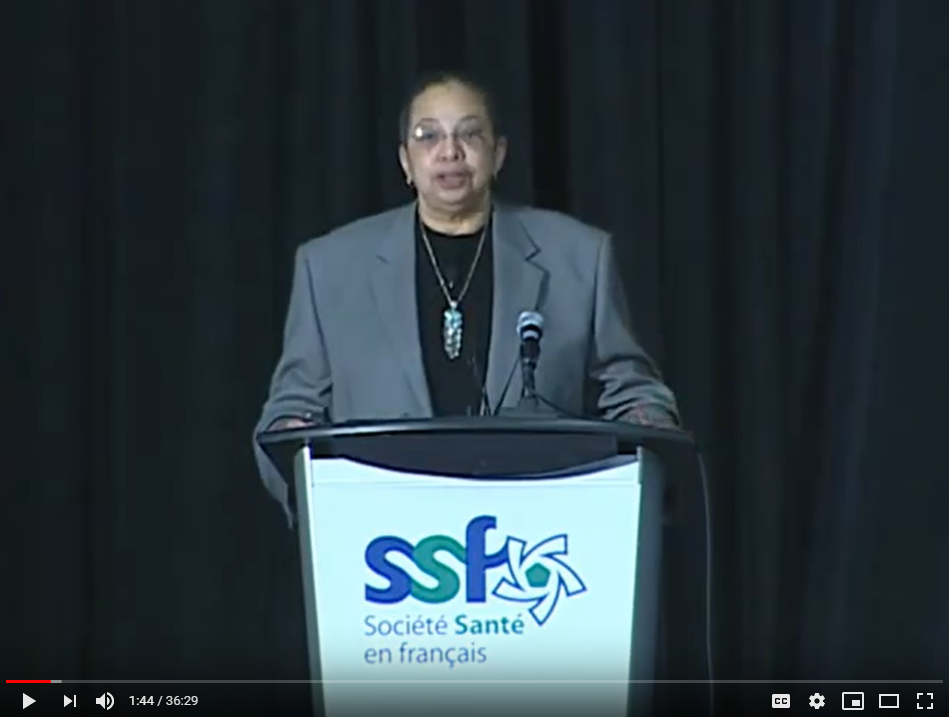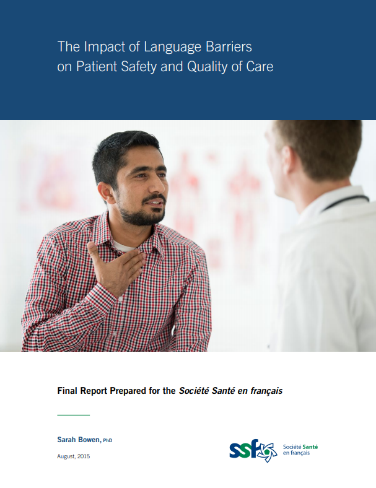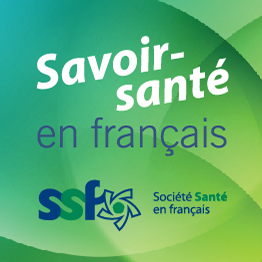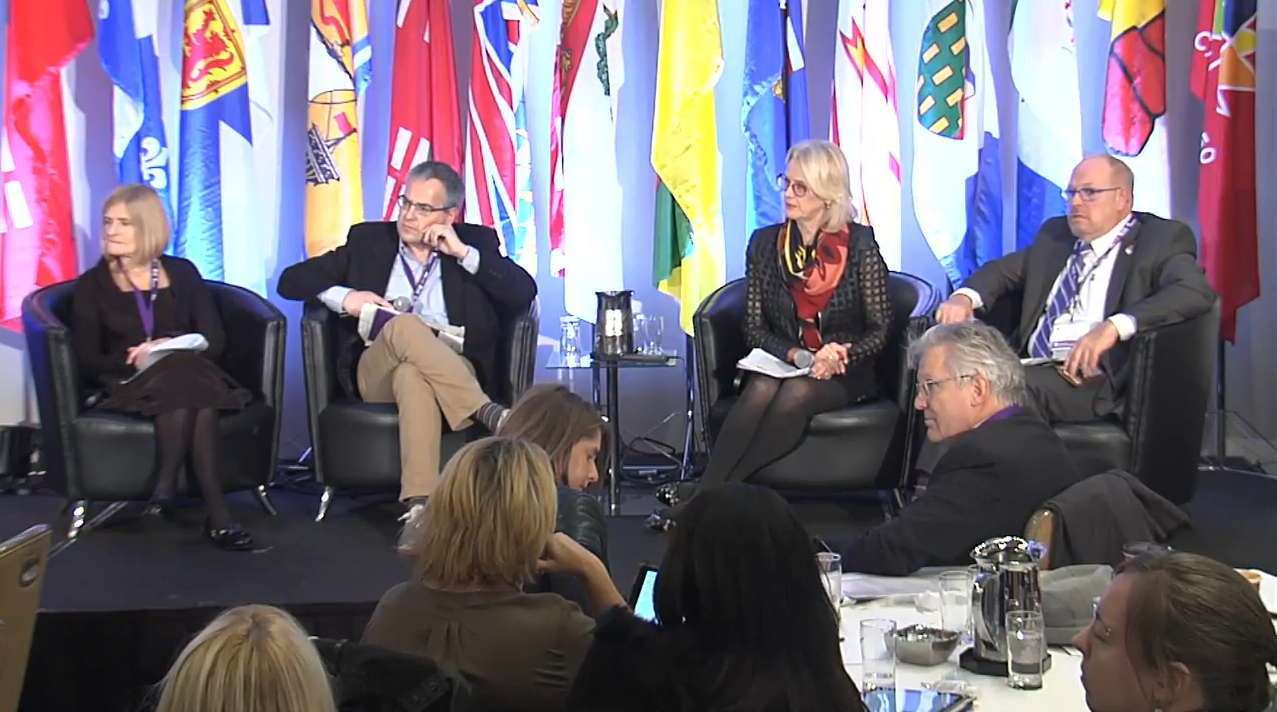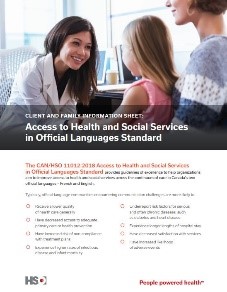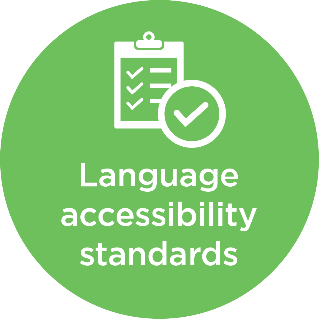Diagnostic
of a Success Story
Implementation of the Access to
Health and Social Services in
Official Languages Standard
Since their creation in 2003, Canada’s French-Language Health Networks have wanted to develop a common base, to build foundations that will have an impact all across the country.
A national standard on language in health care is one of these foundations..
Why have a standard?
A standard is neither a magic wand nor a miracle solution; it is, however, a strong tool in any toolbox. It is a comprehensive assessment mechanism, a developmental mechanism that produces results over the long term.
Implementation of a standard can:
- Reduce language barriers to access to health services
- Reduce the risks associated with poor communication
- Provide a common foundation for language accessibility in health institutions
- Make language accessibility an integral part of quality, safety and efficiency in health care and health services

The Health Standards Organization (HSO) defines its standards as “the very foundation on which leading-edge accreditation programs and great public policy are built”.
By developing strategies for highlighting best practices, we make the importance of French-language health services more visible and more credible.
And we nurture hope! Our results illustrate the potential that can still be achieved…
Why is this a success story?
A shared project
Very early in the history of Canada’s French-Language Health Networks, the language standard project brought the Networks together to work on a shared project. They all wanted to move forward, together, even in the provinces and territories where implementation did not seem possible in the short term.
A tangible measurement
The standard and the recognition program are tangible measurement tools that make it possible to follow the progress of French-language health services over time.
A familiar tool – a new approach
Health systems are familiar with standards. So, it is easier to approach them with a tool they are used to and a goal they share: to improve service quality. This new approach focuses on support and success. It is not a punitive process. Instead, it is a recognition program under which health systems will get the help and tools they need to improve and progress.
Strategic positioning for the French-Language Health Networks
Implementation of the Access to Health and Social Services in Official Languagess standard gave the SSF and the Networks the opportunity to spend time with major players like HSO and Accreditation Canada and become part of the mainstream. The French-Language Health Networks positioned themselves as experts to help their partners implement and meet the standard.
A recipe for success
The main challenge was to educate the key players, who did not themselves feel the need for access to French-language health services, about the importance of such access and the risks associated with language barriers.

It all started with a clear vision of what had to be achieved. It was necessary to dream about something that seemed out of reach, to believe in it, and to make strategic players share the dream by inviting international personalities who had met the challenge to inspire them.

The solidarity, commitment and teamwork of the steering committee members led to collaborative leadership that made it possible to win over the project partners.

A project of this scale has to be tackled one step at a time. Major phases like the search for evidence and piloting the standard in the field were essential. Neglecting these sources of knowledge would have undermined our influence and our ability to persuade. And when a door closes, you can’t be discouraged; you have to go back to steps that are more persuasive.

The confluence of events and availability of funding were a great help in carrying out this project. But we had to know how to leverage them and take advantage of the funding opportunities that came up.

Regular communication is the key to keeping stakeholders motivated. Always being there and taking the time to talk face to face improve knowledge transfer and commitment.

You must be bold, not be afraid to explore the possibilities and venture into new partnerships. Every stakeholder has a role to play in achieving success. When everyone knows their role and contributes their knowledge to the project, while respecting the expertise of others, success is assured!
10 Years of Perseverance
Birth of the Networks
The Networks were established. For some, it was still difficult to play a role in the provincial health system. There was a desire for a common foundation that had the same impact on everyone.
Growing awareness of the issue of linguistic and cultural competencies
The late 1990s and early 2000s saw the emergence of Canadian literature, still limited, on linguistic and cultural competence. The issue was not yet perceived as a priority for health care organizations, but there was growing awareness in the research community and the French-Language Health Networks.
Network position
The Réseau des services de santé en français de l’Île-du-Prince-Édouard (Prince Edward Island French-Language Health Services Network) and the SSF submitted a position paper to the Canadian Council on Health Services Accreditation (CCHSA), The Impact of Communication Challenges on the Delivery of Quality Health Care to Minority Clients & Communities. The paper deals primarily with the way in which language barriers affect the quality of care and the importance of increasing the value assigned to this factor in the accreditation process.
The dream! The vision
Gilles Vienneau, Executive Director of the Société Santé et Mieux-être en français du Nouveau-Brunswick (SSMEFNB), found references in the literature to the Office of Minority Health and its Center for Linguistic and Cultural Competence in Health Care, a health and social services department in the United States, the equivalent of Health Canada. This department was created in the 1990s to improve the health system’s capacity to effectively deliver linguistically appropriate and culturally competent services to populations with a limited knowledge of English. It used a standards-based program: CLAS Standards (Culturally and Linguistically Adapted Services Standards). What if we took our inspiration from this?
Engagement of the SSF and the Networks
At the SSF’s executive directors’ table in Yellowknife (NWT), Gilles Vienneau proposed that the development of standards, like those used in the US, be explored. He invited the executive directors to dream big dreams and explore beyond the Networks. The dream: multiple institutions meeting the same standard. This initial illuminating discussion led to a commitment by the executive directors’ table and the SSF. The idea of a standard became a national project!
Creation of the steering committee
The SSF did not have any immediate funding for this project. Some residual funding in New Brunswick made it possible to launch the project nationwide. A committee was set up that brought together people who saw the project’s potential, did not lack for boldness and had different perspectives:
- Annie Bédard, Executive Director, Santé en français (Manitoba)
- Jacinthe Desaulniers, Chief Executive Officer, Réseau des services de santé en français de l’Est de l’Ontario
- Monique Langis, Director, Réseau-action Formation et recherche (SSMEFNB) – until 2015
- Estelle Lanteigne, Director, Réseau-action Organisation des services (SSMEFNB) – from 2015 on
- Caroline Vézina, Project Officer, Société Santé en français
- Gilles Vienneau, Executive Director, SSMEFNB
Search for evidence
A project of this scale requires research to ensure it is evidence-based. The research came up with a critical analysis of the literature on linguistic competencies (analyse critique de la littérature sur les compétences linguistiques) and the position paper submitted to the Canadian Council on Health Services Accreditation. This was not enough. An exploratory study on the American standards and a pan-Canadian overview of culturally and linguistically adapted health services were commissioned from researcher Suzanne Tremblay. Study Report Rapport des études.
Internal communications
As the project moved forward, the Steering Committee took care to keep the SSF’s Executive Directors’ Committee informed. Occasionally there were disagreements: some people were unable to visualize the expected outcomes and preferred to work on activities that would provide communities with immediate access to French-language health services. An initiative was undertaken to define the standards.
An engagement strategy
The study report (rapport des études) commissioned from researcher Suzanne Tremblay was widely distributed and awakened the interest of other researchers. But the primary partner concerned, Accreditation Canada, does not immediately take part in the project. The committee tackled its first major challenge: influencing a major player unfamiliar with the French-language health movement. Work started on developing an engagement strategy, and several subsequent meetings ensued.
Attracting partners and funders
At the Rendez-vous santé en français 2012, which brought together over 500 partners from all parts of the country, the Steering Committee invited Shani Dowd, a program director with the Harvard Pilgrim Health Foundation, to come and make a presentation on American experience with standards for linguistically and culturally adapted services. Representatives of Accreditation Canada and Health Canada were in the room. This international personality electrified the audience and excited the potential partners.
Influence and positioning
The French-Language Health Networks continued to keep their partners in the provinces and territories informed. The “standards for culturally and linguistically appropriate care and services” project was added to Destination Health 2013-2018 programming as a leveraging project. This made it possible to obtain funding from Health Canada for this leveraging mechanism and to appoint SSMEFNB as the resource Network.
Creation of a pan-Canadian advisory committee
The steering committee assembled a number of experts, including representatives of Accreditation Canada, Health Canada, the Canadian Institute for Patient Safety and Quebec’s Anglophone communities in a new pan-Canadian advisory committee. The role of this committee was to provide advice and recommendations on implementation of language accessibility standards. The SSF successfully positioned itself, not only as funder (through the funding it obtained from Health Canada), but also as field expert.
Self-assessment tool pilot projects
On the recommendation of the pan-Canadian advisory committee, Accreditation Canada took its first step and developed a series of voluntary language accessibility self-assessment tools. These tools helped institutions assess their ability to provide health services to people from linguistic minorities on the basis of their strengths and weaknesses in leadership, governance and services. The committee wanted to test these tools through a pilot project in health institutions. The French-Language Health Networks went to work informing their partners about the project and persuading three to be pilot sites:
- Réseau de santé Horizon Health Network — New Brunswick Heart Centre, Saint John, N. B. (acute and tertiary care)
- Bendale Acres Long-Term Care Home, Scarborough, Ont. (long-term care)
- Southern Health – Santé Sud – Hôpital Ste-Anne Hospital, Ste-Anne, Man. (acute care)
More evidence required
The results of the self-assessment tool pilot project were conclusive. The participating organizations indicated that this was a useful learning opportunity and appreciated the fact that their French-language services and related processes had been assessed and validated1. There was an interest in recognition programs! But Accreditation Canada wanted more evidence on the impact of language barriers on patient safety and quality of care. The SSF therefore asked researcher Sarah Bowen to update her literature review Language Barriers in Access to Health Care. This new study, published in 2015, became a key element of of the French-language health movement’s engagement strategy. The Impact of Language Barriers on Patient Safety and Quality of Care.
1Accès linguistique – Rapport d’évaluation; prepared by Accreditation Canada for Société Santé en français, April 2016.
Interpersonal issues within the steering committee
Interpersonal issues within the steering committee led to a degree of disengagement on the part of its members and affected the project’s progress. It is important to recognize people’s involvement and give credit to the right people for moving the project forward.
Launch of the Savoir-santé en français portal
The need for a place where data and best practices could be accessed was raised at the same time as the lack of evidence. In 2015 the SSF had started work on the creation of an electronic resources portal that brought together different types of tools produced by all the French-Language Health Networks and their partners. Savoir-santé en français was launched in 2016. Work was also started on development of an implementation framework, a kind of how-to for health care institutions wishing to improve their active offer of French-language services.
Creation of HSO and HSO-SSF agreement
A change of leadership at Accreditation Canada brought about the establishment of a new philosophy more open to French. Accreditation Canada created the Health Standards Organization (HSO), with responsibility for developing standards, and retained responsibility for application of these standards. The time was ripe to seize the opportunity and be strategic: develop a business case aligned with the values and intentions of the new governors and ally with champions within the organization. And it worked! An agreement was reached with HSO to develop a language accessibility standard. This standard would act as an important lever in leading institutions to integrate language accessibility practices as indicators of quality and safety for minority official language populations in Canada.
Health Canada funding
Throughout the project, funding from Health Canada was crucial. To obtain this funding, the influence of Michel Tremblay, the SSF’s Executive Director from 2013 to 2019, and the information strategy played an important role, which enabled the SSF to accompany and fund each stage of the project.
Implementation of a technical committee
A technical committee of experts was set up to examine and develop standards on the effectiveness, openness and clarity of communication in the delivery of health services in a minority language situation, with a focus on Canada’s two official language minorities (Anglophones in Québec and Francophones elsewhere in Canada). The standards dealt with the structure and organizational processes required at the governance and management levels to promote and ensure effective communication. They were developed within the framework of a process of participation and joint creation in which users, community members, families, health service providers, clinicians and decision-makers all had a voice.
Members of the technical committee:
- Gisèle Lacroix, Alberta Health Services
- Dounia Najahi, volunteer, Fonds Croire
- Audrey Fournier, La Fédération franco-ténoise
- Carmen Millar, Health Access
- Dr Aitor Montes Lasarte, OSAKIDETZA-Basque National Health System
- Grace Eagan, Access Alliance Multicultural Health and Community Services
- Janine Doucet, N. B. Heart Centre
- Gayle Lamont, Summerset Manor
- Dana Mohr, Winnipeg Regional Health Authority
- Tharcisse Ntakibirora, Toronto Central LHIN
- Angela Sasso, Critical Link International
- Elizabeth Abraham, WHO Europe
- Gilles Vienneau, SSMEFNB
- Dr Gwerfyl Roberts, School of Health Sciences
- Dr Chad Hammond, University of Ottawa
- Jeanne d’Arc Gaudet, Société de l’Acadie du Nouveau-Brunswick
Influencing international partners (Wales and Basque Country)
The Canadian experience with development of a standard began to pique the interest of other communities in a minority language situation, like Wales and the Basque Country. The SSF was invited to make a presentation “Strategies to increase access to health services for Francophone minority communities in Canada” at the symposium Language and Health Care in a Bilingual and Multicultural Context at the University of the Basque Country, in Bilbao in June 2017. The links created at Bilbao made it possible to invite Aitor Montes (Spanish Basque Country) and Gwerfyl Roberts (School of Health Sciences, Bangor University, in Wales) to take part in a panel at Rendez-vous Santé en français 2017.
Public consultation
Public consultations were held between February and April 2018. The French-Language Health Networks conducted an information campaign to encourage their partners to respond to the survey (in French). A total of 159 respondents gave their opinion. The results included a change in the name of the standard, which went from “Communication in Official Minority Language Situations” to “Access to Health and Social Services in Official Languages”.
Publication of the standard
In 2018, “CAN/HSO 11012:2018 – Access to Health and Social Services in Official Languages” was published. This was a major step towards success, but the work was not finished! Now we needed to promote the standard and field-test it. HSO prepared its assessment guide and the Health Networks worked to integrate strategic and policy supports from every province and territory. The SSF enabled various conversations with its partners around the standard: presentations are being made at conferences, including the National Health Leadership Conference, and provincial and territorial forums.
Pilots at four sites
Accreditation Canada tested the recognition program by assessing four sites as part of a pilot project.
- Hôpital Saint-Boniface Hospital, in Winnipeg (Manitoba)
- Canadian Forces Base Shilo (Manitoba)
- Hôpital Montfort Hospital, in Ottawa (Ontario)
- Portage Atlantic Centre, in Cassidy Lake (New Brunswick)
This process demonstrated the strengths of the program and provided recommendations for improving the program at the next stage.
EQUITY ACCESS
In parallel, there was a desire to facilitate the meeting of the criteria in the standard. A number of tools, resources and strategies have been developed in the last 15 years to help managers put in place French-language health and social services. The French-language health networks’ expertise in this area needed to be centralized and easily accessed by managers and their teams. To address this need, the movement co-developed the eQUITY Link project.
The French Health Network of Central Southwestern Ontario spearheaded this initiative on behalf of the Société Santé en français, engaging all 16 French-language health networks in the process. The end result was eQUITY Fundamentals. This resource charts a six-step path and aligns the strategies, tips, and tools, which are presented with the recognition program criteria. A coaching service for health managers will also be created to help them better meet the requirements of the standard.
GROUNDWORK
The coaching process undertaken as part of EQUITY Link began to take shape. Through an ongoing in-depth training process, a network of capacity building experts would eventually offer a coaching service based on the principles of the Access to Health and Social Services in Official Languages standard. These experts in French-language health would learn the ins and outs of EQUITY Link and gain familiarity with its components, such as the initial self-evaluation and the personalized action plan.
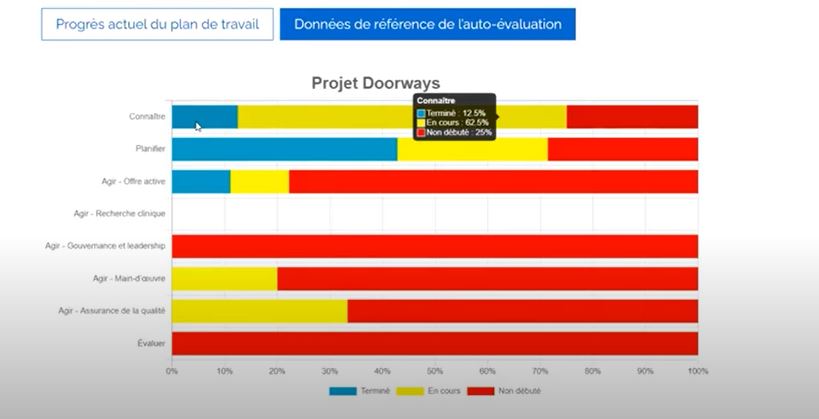
LAUNCH OF EQUITY LINK PLATFORM
The EQUITY Link platform opened to the public. People involved in the network of experts began coaching health managers and comparing real-world experiences gained in a wide variety of settings! The continuous improvement process was under way.
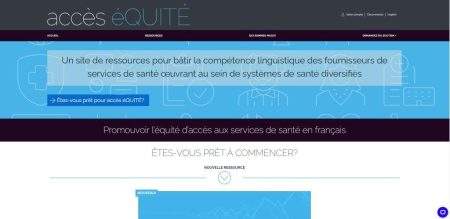
RECOGNITION PROGRAM
Accreditation Canada, a behind-the-scenes partner since 2017, took the reins of the Canada-wide project entitled “Access to health care and social services in the official language’s standard recognition program.” Thanks to funding from Health Canada, the project would set the stage for implementing the specific recognition program, administered by Accreditation Canada, with the goal of supporting and compensating health and social service organizations that commit to promoting access to reliable services in the language that users prefer or request. A committee was formed, made up of members of Accreditation Canada, the SSF, the French Health Network of Central Southwestern Ontario, the Société Santé et Mieux-être en français du Nouveau-Brunswick and the initial supervisory committee. The aim was to ensure continuity from original concept to implementation tools to product promotion.
STANDARDS MAINTENANCE PERIOD
The technical committee formed by HSO in 2016 was reconvened. Its role at this stage is to fully revise the content and republish the standard.
RECOGNITION PROGRAM – LEVEL 1
The standard recognition program was launched. The first level – Discovery – consists of a self-evaluation and self-determination of priorities. The purpose is to get a significant number of health organizations interested in the standards and the recognition program, and to get them to consider adding recognition of the Access to Health and Social Services in Official Languages standard as part of their accreditation process. Relationships have also been formed between the Official Languages Recognition Program and EQUITY Link, thus demonstrating the complementarity between these initiatives.
FORMATIVE EVALUATION OF EQUITY LINK
The formative evaluation plays a key role in EQUITY Link’s continuous improvement process. The evaluation report makes special mention of the following:
- The importance of continually updating the platform to stay up to date on new practices within the sector, and on regional adaptions depending on the context
- The in-depth training approach as the activity with the most added value (sharing of experience, coaching between networks and experts)
- The need to raise the profile of EQUITY Link over time
Conclusion: It is essential to plan a second phase for the EQUITY Link project, which will be part of the new 2023–2028 national program.
Reality
Will the “CAN/HSO 11012:2018 – Access to Health and Social Services in Official Languages” standard be widely used? Will we have succeeded in promoting heavy enrolment in Accreditation Canada’s recognition program? Might it henceforth be mandatory? Reality will begin to resemble the dream we had in 2010…but we can still dream and dream big!

What now?
The standard is in place … has the gamble paid off?
Not yet! The most important part is still to come: making sure it is used.
We now need to publicize the standard, encourage health institutions to register for Accreditation Canada’s recognition program and take the necessary steps to ensure that access to health and social services in official languages becomes a reality.
If we allow ourselves to dream bigger … we might want to see this standard integrated into the Official Languages Act and make it mandatory in all of Canada’s provinces and territories. Our work is far from finished.

